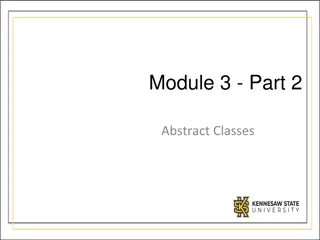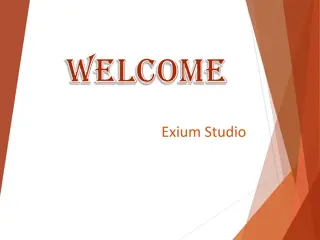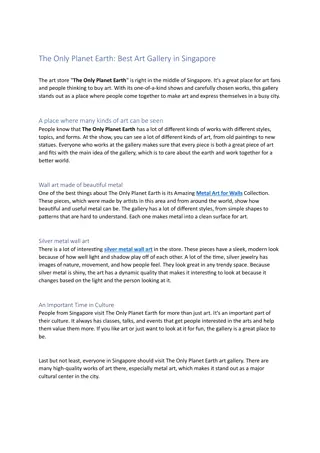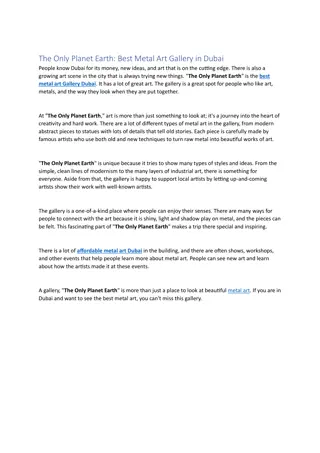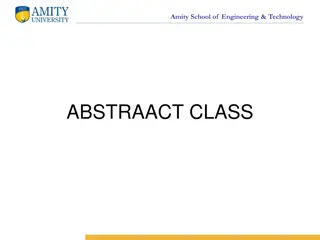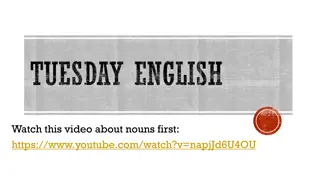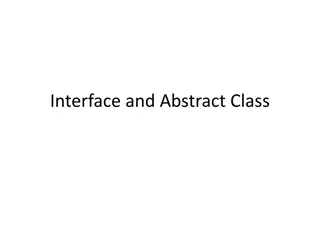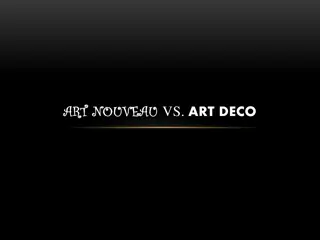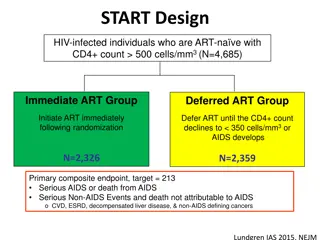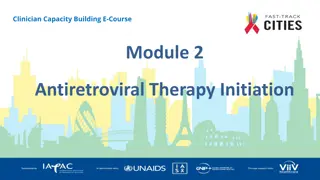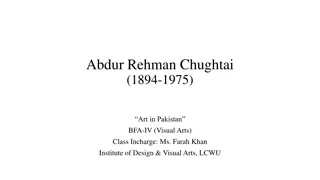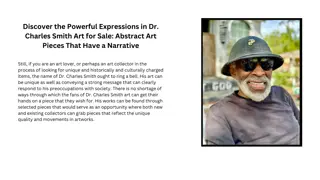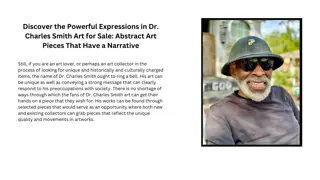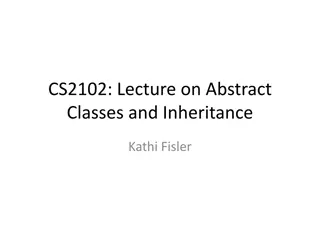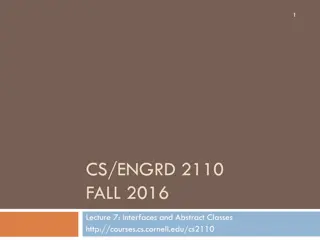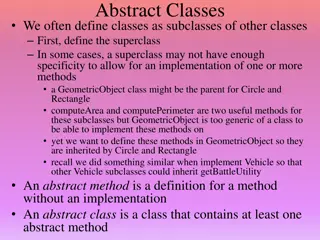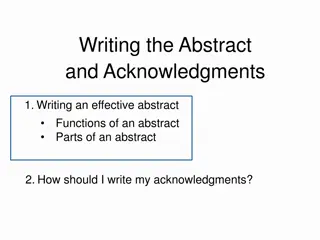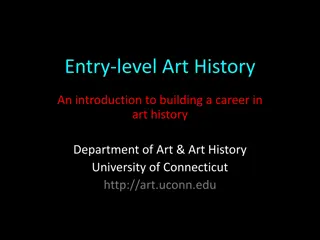
Crafting a Strong Abstract for Research Projects
Learn how to write a compelling abstract for your academic endeavors. Understand the key components like hook, significance, background, research findings, and call to action. Explore the importance of abstracts in grant proposals, conference submissions, and scholarly papers, with a focus on a case study about the conservation status of freshwater crabs in Colombia.
Download Presentation

Please find below an Image/Link to download the presentation.
The content on the website is provided AS IS for your information and personal use only. It may not be sold, licensed, or shared on other websites without obtaining consent from the author. If you encounter any issues during the download, it is possible that the publisher has removed the file from their server.
You are allowed to download the files provided on this website for personal or commercial use, subject to the condition that they are used lawfully. All files are the property of their respective owners.
The content on the website is provided AS IS for your information and personal use only. It may not be sold, licensed, or shared on other websites without obtaining consent from the author.
E N D
Presentation Transcript
Abstract Art: How to Write a Strong Abstract for Your Research
Theyre required for certain types of writing, like research grants, conference or scholarship proposals, and some academic papers. What do we know about abstracts? They re short (usually 250 words max). They re thorough.
Hook Significance Anatomy of an abstract: Background information Research Call to action
Hook: win your audience s attention Freshwater ecosystems are highly threatened by human activities, and recent conservation assessments suggest that a third to half of aquatic species, including freshwater crabs, may be threatened with extinction.
Freshwater crabs play an important role in the food chain and nutrient cycling in freshwater ecosystems because these crustaceans represent a high percentage of the biomass in these systems. Significance: make it matter
Background: give your audience any other details they need Freshwater crabs are found in topical and subtropical regions and are assigned to five families, two of which (P and T) are the subject of this study. Colombia is ranked sixth in the world for the size of its freshwater ecosystems, and its freshwater crabs are ranked second in the world for their diversity. The 2008 IUCN global conservation assessment listed 101 species of freshwater crabs in Colombia of which 13.9% were classified as threatened, and 406.% were Data Deficient.
Here we report on the results of a countrywide reassessment of the freshwater crabs of Colombia carried out in 2015. The study found 25% of species of Colombia s freshwater crabs to be in one of the threatened categories, and that 7.7% were Data Deficient. The major threats to freshwater crabs in Colombia are deforestation and water pollution from agriculture, mining and urban development. Species of the P family are more affected by these threats, due to their distribution at higher altitudes where the impacts of urbanization are most felt. Research: share what you ve found (or hope to find)
Call to action: tell your audience what they (or society) should do now that they know your topic This study illustrates the need for the development of new conservation strategies and for more field studies on the freshwater crabs of Colombia.
Wild horses symbolize liberty and beauty, yet are shrouded in misconceptions primarily that Mustangs are untrainable and useless. I hope to explore these myths through a collection of short, creative nonfiction stories. My first horse was a Mustang named Wild Diamond, who was captured and later adopted from a holding facility. I began entering competitions with W.D. at age three and witnessed wild horses potential to bond with humans. After my younger sister died in a riding accident, my parents rehomed W.D. I believe that my story of loss holds many parallels to that of Mustangs struggle for survival. Grant Application Abstract Through firsthand observation, I hope to explore questions such as, can useless horses be redeemed? Can overused land be renewed? Can my family s trauma be healed? I will write a collection of short creative nonfiction, totaling forty pages, to tell three intertwining stories: that of my travel through the western U.S., my search for personal healing, and Mustangs journeys through captivity, training, and adoption. These stories will later inform my book-length MFA thesis manuscript. I will use the Excellence in Education grant to observe wild horses and herd management practices on-location. I will tour holding facilities to learn about the roundup and adoption process overseen by the Bureau of Land Management (BLM). I will attend an adoption event, where private citizens purchase captive Mustangs to reduce the population of horses roaming public lands. Finally, I will attend a training clinic to observe Mustang taming techniques.
Personal trainers are people who give fitness instructions. They understand their clients needs, they provide feedback to help improve their clients fitness routines, and they assist their clients in setting goals and accountability. Writing tutors, likewise, help students strengthen their writing muscles so that the students can achieve their individual writing goals. Presenters of this panel will compare personal training strategies with tutoring strategies, and they will discuss how tutors could learn from personal trainers and apply some of the fitness training strategies to motivate and assist tutees to be better writers in their chosen disciplines. Conference Proposal Abstract Speaker A will describe the similarities between personal trainers and writing tutors, and discuss the advantages of having writing centers adopt some of the practices of athletic training centers. Speaker B will offer specific tutoring strategies for working with writers from different disciplines. Speaker C will focus on the topics of creation vs. imitation and competition vs. conditioning, and argue that writers create and imitate simultaneously when they write, just like athletes who cannot compete without conditioning.Speaker D will present personal experiences working with trainers and tutors, and conclude that improving one s writing skills is not too different from improving one s fitness prowess, both of which involve diligence and proper guidance. The panelists will wrap up the presentation with a short fitness training routine and writing exercise that the audience could bring back to their writing centers
Alonso, Ada Acevedo. Assessment of the Extinction Risk of the Freshwater Crabs of Colombia. 23rdAnnual Celebration of Student Scholarship: Program of Events 2018. Emily, Megan. The Wild Diamond Diaries: Healing Alongside America s Wild Horses. Excellence in Education grant proposal. 2018. Works cited: Lehmberg, Z.Z. Trainers of Writing Fitness: What we can learn from fitness centers. International Writing Center Association conferece proposal. 2019.


